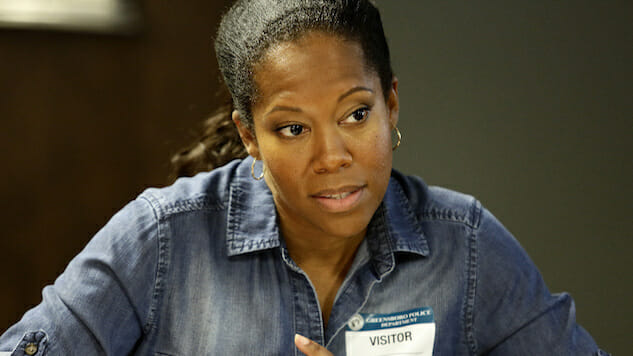How ABC’s American Crime Tackled Its Most Hot-Button Topics Yet
ABC/Nicole Wilder
John Ridley’s anthology series American Crime has developed a reputation for breaking down how the most simple idea—a car being loaned to the wrong person, locker room talk gone awry—can lead to extreme, headline-grabbing consequences. With recurring themes related to our country’s particular troubles with bullying, drug use, violence and racism, the Emmy-winning series has received much-deserved acclaim. But neither of the ABC series’ previous chapters has coincided as perfectly with the zeitgeist as the upcoming third season.
The latest American Crime cycle is set in North Carolina and tackles two of the most heated topics from last year’s presidential debates: immigration and women’s health. The narrative that will likely receive the most attention is the former, which focuses on the conditions for migrant workers on a tomato farm—from the perspective of both the Mexicans who work the fields and the family that owns the land.
Production on Season Three started long before Election Day. Although it’s easy to call this chapter a battle cry against President Donald Trump and anyone who’s ever held a “build the wall” sign, Ridley maintains that these stories would be important ones to tell regardless of who was commander in chief.
“Immigration, that conversation is not new, and it’s not relegated simply to the United States of America,” Ridley told journalists in January at the show’s Television Critics Association panel in Pasadena, Calif. “It’s happening everywhere. And this show, even though it’s called American Crime, it plays across the world. So if we’re not engaging all people and being observant rather than preaching and proselytizing, then we’re not doing our jobs.”
It’s not uncommon for people to have visceral reactions to this part of the series; even executive producer Michael J. McDonald says he now thinks twice when he’s in the produce aisle. “If you’re gonna buy tomatoes, buy the ugly tomatoes,” he advises Paste in a phone interview. “They’re picked by hand, but the thing that we learned is that most of the tomatoes that look perfect and beautiful are really picked hard and green and then put in a giant warehouse and then gassed to turn red.”
While he doesn’t want American Crime to seem one-sided and preachy, McDonald says he hopes audiences will come to understand that “the comfort that we all live in is—unfortunately—coming from the discomfort and sweat and tears of other humans. We wanted to open up to Americans that we have people living in slave conditions in this country right now.”
“That environment exists and people are going to [react] in two ways politically,” he continues. “There’s the Trump way, which is, ‘Let’s just clear them all out.’ And there’s the more, I would say, humane response, which is, ‘How do we protect these people? How do we make them legal parts of our society because they’re already here and their children are born here?’ We have an obligation to protect every member of our society who participates. They actively work in our country to make it a better country.”
As if these images of modern-day indentured servitude weren’t enough of a sucker punch for the (most likely) liberal-minded audience, American Crime adds some language barriers. Spanish is used frequently in the course of the new season—but the same is not necessarily true of subtitles.
“If you’re a fan of the show, you know that we try to be as truthful to the reality of the situation as possible without kowtowing to the edicts of network television, and ABC has been very supportive of us,” McDonald says. “We wanted to demonstrate to people who are at home who may not speak Spanish what it is like to be in a place where everyone’s speaking a language that you can’t understand. I think people will respect it because, I think, it’s reality, and I think it’s the experience to watch our show and feel what it’s like to be at a distance from people—to not understand what’s going on.”
He explains that, as American Crime shows, “many, many Mexican immigrants don’t even speak Spanish; they speak indigenous languages.” These people, in particular, really have nowhere to go and no one to turn to for help if they are isolated, abused or mistreated in their workplaces or elsewhere. He says they wanted to examine what it’s like for those who are “afraid to do anything because they’ll get deported and they don’t even speak the language.”
McDonald also hopes that the series will make us think twice about about who exactly is a villain in our own society. Here, no-bull family matriarch Laurie Ann Hesby (Cherry Jones) wants cheap labor, even if it comes at the risk of unsafe living conditions or the consternation of her naïve, do-gooder sister-in-law, Jeanette (American Crime stalwart Felicity Huffman, finally playing a character who’s easy to root for). This directive eventually lands at the feet of Diego (Clayton Cardenas) and Isaac (Richard Cabral), farm crew chiefs who get their boss what she wants—but not without taking something for themselves along the way.
-

-

-

-

-

-

-

-

-

-

-

-

-

-

-

-

-

-

-

-

-

-

-

-

-

-

-

-

-

-

-

-

-

-

-

-

-

-

-

-








































